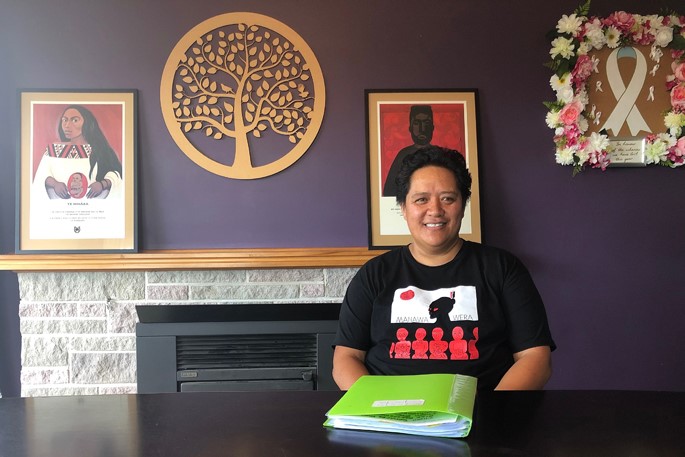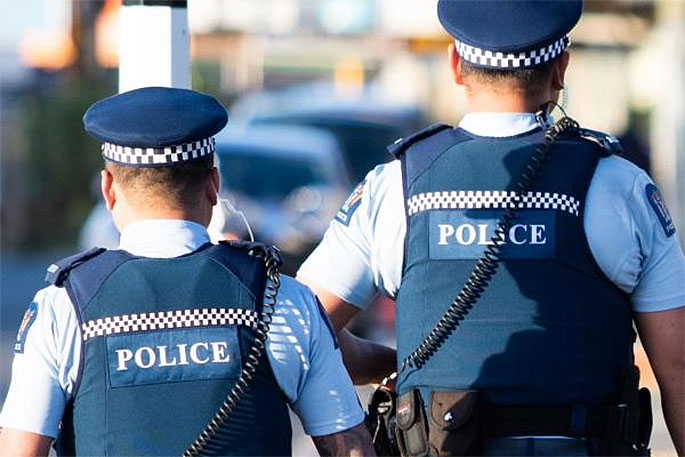-Stalking is persistent and unwanted attention from someone that makes you feel intruded upon and harassed.
-It is not a single one-off incident and can include things like hanging around outside your house or work, following you, or continually contacting you by phone, mail, email, messaging or social media.
-The person’s behaviour can make you feel alarmed or distressed, or even afraid they might harm you. - Source: Victim Support
For those who have recently watched the Netflix TV series Baby Reindeer, it may interest you to know that stalking is not an offence in New Zealand.
This means that if you were in a situation where you were being stalked, you may have to jump through hoops to feel any kind of support from the police or justice system. Ayla Yeoman reports:
When SunLive approached Minister of Justice Paul Goldsmith on the subject of stalking, he said: “I want to ensure you that I, and the Government as a whole, take stalking very seriously.”
The issue has recently been highlighted by New Zealand social media star, winner of Dancing with the Stars 2022 and advocate for mental health and suicide prevention Jazz Thornton.
Jazz has spoken in an Instagram post of her recent experience with stalking. In the post, she describes her experience and how she felt when she was told the police couldn’t do anything until things escalated.
“It is wild to me that stalking is not a crime here in New Zealand. Having experienced it very recently in a very scary situation it was so horrific having to live on the edge, worried about every sound you hear,” she writes in the post.
“Knowing the police must sit and wait for him to escalate not knowing his intentions of flying more than 20 hours to find me was terrifying to not only me, but everyone close to me who this man had both contacted and impacted.
“I was lucky in the fact that it didn’t reach the worst-case scenario – but others have not been as lucky.”
Jazz created a petition called Protect Women: Make Stalking Illegal, saying “Victims of stalking should not have to fear for their safety because of a lack of law.
“The guy has now left the country, so we are safe – but others are in the same situation. Make the government act on their promise pre-election of making this a crime.”
Tauranga Women’s Refuge manager Hazel Hape says stalking is common for the women that she sees in her work, especially in circumstances that involve domestic violence, family violence and sexual violence.
 Tauranga Women’s Refuge manager Hazel Hape.
Tauranga Women’s Refuge manager Hazel Hape.
Tauranga Women’s Refuge family safety service coordinator, Lyric Ratahi says, “A lot of the wāhine I have spoken to all have the same korero, they aren’t safe anywhere. At home, at work, at the supermarket, taking the kids to school. It is a constant state of hypervigilance, often looking over their shoulder, looking around every corner.
“One wahine I spoke to recently spoke about feeling like she was going crazy. Every time she saw a ute that was the same colour/make/model as her ex-partner’s she would immediately panic and would break down into tears or run regardless of where she was or what she was doing.
“It is a constant terror and this wahine had been told by people within her own culture that it was her fault for leaving the marriage and that she has duties as his wife to return to his home.
“In this wahine’s case, we [Tauranga Women’s Refuge] were the last resort. She felt like any time she had ever told someone she felt that little bit more ‘crazy’ because the people around her would minimise her feelings and he had gaslit her into believing that no one will believe her, no one cares.
“She wasn’t willing to get support from services because he ‘Hadn’t done anything bad enough’.
“She had called police; she had moved from overseas to Tauranga to escape him and spoke to agencies in the area about her experiences.
“Support services in Tauranga would validate her experiences, ensured that she was heard, and strengthened/created support networks around her to ensure that her perceived threats of violence were handled with the respect and dignity she deserved.
“They supported her to ensure that her workplace was made aware of her situation and reminded her of her ability to take domestic violence leave, supported her through the process of obtaining protection orders and education about how to use it. Linked her in with the ability to obtain personal safety alarms, provided her with a new cell phone and ensured support services numbers were accessible.”
Knowing that police couldn’t intervene in the case of stalking, “She felt terrified, and it validated the already heightened beliefs around systematic entrapment, being told that unless she had evidence and was willing to make a statement they couldn’t do anything. Stopping her from feeling like she could call police again.”
 Minister of Justice Paul Goldsmith. Photo: RNZ.
Minister of Justice Paul Goldsmith. Photo: RNZ.
Goldsmith says, “In my role, I regularly hear from victims of stalking about their experiences, and I recently met with representatives of the Auckland Coalition for the Safety of Women and Children to discuss this issue.
“Stalking behaviours have the potential to escalate quickly and have dangerous outcomes.
“While the behaviours that can constitute stalking are covered by several laws, including the Harassment Act 1997, Crimes Act 1961, Family Violence Act 2018, and Harmful Digital Communications Act 2015, we do not have a standalone ‘stalking’ offence.
“The closest equivalent to stalking would be harassment in the Harassment Act. Though ‘stalking’ is not specifically named, the behaviours associated with it are captured by the definition of harassment: a pattern of behaviour that includes any specified act on at least two separate occasions within 12 months.
“Some behaviours may also qualify as criminal offences, such as criminal harassment under section 8 of that Act, threats under the Crimes Act, or causing harm online under the Harmful Digital Communications Act.
“Legislation also sets out civil responses to protect people from stalking behaviours.
“The Family Violence Act allows the court to issue protection orders in cases of family violence, which can include stalking and harassment behaviours.
“The Harassment Act also allows the court to issue restraining orders. It is a criminal offence for a respondent to a protection order, or a restraining order, to breach the order.
“On June 26, I received a petition outside Parliament calling for the introduction of anti-stalking legislation.
“At this time, I announced that I am committed to introducing anti-stalking legislation this year.
“This will make changes to the law to address the issue of stalking more effectively, including through a new offence.
“We want to send a clear message that society does not tolerate stalking, nor any kind of sexual or family violence.”
 Police encourage victims to take proactive steps to protect themselves.
Police encourage victims to take proactive steps to protect themselves.
Police action towards stalking
In New Zealand, stalking is not an offence type, says a police spokesperson.
“New Zealand Police emphasise that stalking is a serious issue, and we encourage victims to take proactive steps to protect themselves while the authorities work to investigate and address the situation.”
The spokesperson says that if someone reports that they are being stalked, police can take several actions to address the situation and ensure the safety of the victim.
Immediate Response
If the situation is urgent, police will respond immediately to the emergency call – dial 111.
“Police will assess the immediate risk to the victim and take steps to ensure their safety.”
Investigation
Police will gather and collect detailed information from the victim about the stalking incidents. This information includes dates, times, and any evidence (such as messages, emails, or photos).
“They may interview witnesses or other individuals who might have relevant information.”
Protective Measures
“Police can help the victim develop a safety plan, which can include changes to daily routines and securing the victim’s home.
“A protection/restraining order is also an option – the victim can apply through the Court for an order to legally restrict the stalker from contacting or approaching the victim.”
Legal Action
“Police may issue a warning to the stalker if the behaviour does not meet the threshold for criminal charges.
“If there is sufficient evidence, Police can arrest the stalker and charge them with relevant offences.
“Stalking can be prosecuted under various charges, such as harassment under the Harassment Act 1997 or criminal harassment under the Crimes Act 1961.”
Support Services
“Police can refer the victim to support services, such as counselling, victim support groups, and legal aid.
“NZ Police takes stalking seriously and aims to provide comprehensive support to protect victims and prevent further harassment.”
What sort of evidence is required for claims of stalking?
“In New Zealand, evidence is crucial for substantiating claims of stalking and enabling police to take appropriate action. Here are the types of evidence that can support a claim of stalking:
Documented Incidents
“Logs and diaries: Maintain a detailed log or diary of all stalking incidents. Include dates, times, locations, descriptions of the behaviour, and any witnesses present.”
Electronic Evidence
“Messages and emails: Save and print any threatening or harassing text messages, emails, social media messages, or other electronic communications.
“Phone records: Keep records of any unwanted phone calls, including call logs and voicemail messages.”
Physical Evidence
“Photographs and videos/security: This can include photos of the stalker near your home, workplace, or other locations where they have followed or approached you.
“Gifts and letters: Retain any unwanted gifts, letters, or notes received from the stalker. These can be used to demonstrate a pattern of unwanted attention.
“Medical reports: If the stalking has resulted in physical harm or psychological harm, medical reports documenting injuries and mental health can be crucial.
To create an official record of the stalking behaviour, “File a report with the police each time an incident occurs.”
Social Media Activity
“Screenshots or records of the stalker’s activity on social media platforms can be relevant, especially if they are using these platforms to harass or track you.
“Gathering comprehensive evidence helps build a strong case against the stalker and can lead to more effective legal and protective measures.”
What limitations do police face when presented with an allegation of stalking?
Police face several limitations that can affect their ability to respond effectively when presented with an allegation of stalking. These include:
Evidential Challenges
“Stalking often involves behaviour that can be subtle or difficult to prove, such as unwanted communication or following the victim.”
The police spokesperson says that without substantial evidence, it can be challenging for police to take legal action.
“The impact of stalking is often subjective, and what one person perceives as threatening may not be seen the same way by others, including law enforcement or the courts.”
Legal Framework and the threshold for Criminal Charges
The spokesperson says the behaviour must meet specific legal criteria for criminal charges under the Harassment Act 1997 or the Crimes Act 1961.
“If the behaviour does not clearly meet these thresholds, the police may be limited in their ability to prosecute.”
Resource Limitations
“Stalking cases can be resource-intensive, requiring significant time and effort to investigate thoroughly and Police may be constrained by their available personnel and resources.
The severity and immediacy of the threat can make law enforcement agencies prioritise the case.
Technological Constraints
“Gathering and interpreting digital evidence from social media, messaging apps, and other online platforms can be complex and time-consuming.
There are also challenges related to obtaining records from technology companies, especially if they are based overseas, says the spokesperson.
Judicial System
“The court/legal process can be slow, and obtaining court orders or prosecuting a stalker can take time.”
During this period, the victim may remain vulnerable.
“In criminal cases, the burden of proof is high, requiring evidence beyond a reasonable doubt, which can be difficult to achieve in stalking cases.”
The spokesperson says that despite the limitations, New Zealand Police are committed to addressing stalking and supporting victims.
“We work closely with other agencies and organisations to provide comprehensive support and protection.
What advice do police have for people who believe they are being stalked or people whose lives are being greatly impacted by stalking behaviours?
“New Zealand Police offer several pieces of advice for individuals who believe they are being stalked or whose lives are being significantly impacted by stalking behaviours.”
Here are some key recommendations from NZ Police
Report – if you believe you are being stalked, report it to police as soon as possible. In an emergency, call 111.
Document all incidents of stalking, including dates, times, locations, descriptions of the behaviour, and any witnesses.
Save communications - preserve any texts, emails, messages, or voicemails from the stalker. Photographs or any physical evidence, such as unwanted gifts or the stalker’s presence near your home or workplace.
Ensure your electronic devices are secure with strong passwords and updated security software. If you aren’t device savvy, ensure to seek assistance.
Consider applying for a Protection Order/harassment order – these can legally restrain the stalker from contacting or approaching you.
Develop a safety plan, which might include changing your routines, securing your home, and informing trusted people about the situation.
Consider installing home security such as installing locks, alarms, and security cameras.
Try to vary your travel routes and routines. Avoid isolated areas and have someone accompany you when possible.
Consider using a mobile app that can alert others if you are in danger. Do not engage with the stalker or respond to any attempts to contact you.
Adjust the privacy settings on your social media accounts to limit the stalker’s ability to track your activities.
Contact Victim Support New Zealand for assistance, they can give advice about support services that can assist your situation.
Make sure to inform friends, family, neighbours, and co-workers about your situation so they can help watch out for you and provide support.
If possible, make sure to inform your employer or security personnel at your workplace so they can assist in ensuring your safety at work.



0 comments
Leave a Comment
You must be logged in to make a comment.